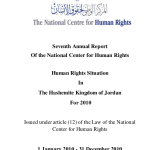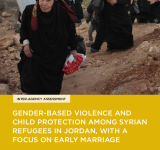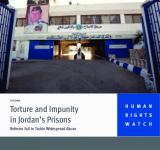This annual report comes to diagnose the situation of human rights in the Hashemite Kingdom of Jordan in 2010;; and to point out the positive or negative changes that have occurred during that period. The report comprises the outcome of the accumulated experiences of the Center in the field of protecting civil;; political;; economic;; social and cultural rights. It also comprises a qualitative addition represented in the devotion of an axis related to the assessment of how serious the Government is in taking appropriate legislative;; judicial and executive measures needed to implement the recommendations by the treaty committees. The main themes are: Civil and Political Rights;; Economic;; Social and Cultural Rights;; Women's Rights;; Child Rights;; Rights of Persons with Disability;; Rights of the Elderly. The report proposes legislations;; policies and measures that are believed to contribute to changing the current situation of Human Rights for the better;; especially in the light of the rapid developments taking place in the Arab region.


